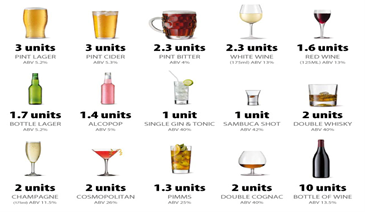Alcohol dependence can be physical and/or psychological. People often experience a strong desire to drink despite difficulty in controlling it's use and suffering harmful consequences.
Alcohol Dependency can happen to anyone, but change is possible.
Unit guidance
From 2016, The Chief Medical Officer recommends that it is less of a risk to drink less than 14 units of alcohol per week (for both men and women) spread over several days, with alcohol-free days.
There is no completely safe level of drinking and drinking even small amounts of alcohol can incur risks in certain circumstances.
Be aware when giving advice that those drinking dependently should be advised against abrupt cessation and seek specialist service interventions.
Example units:
- 3 units - One pint or larger or cider
- 2.3 units - One pint of bitter or a 175ml glass of white wine

- 1.6 units - 125ml glass of red wine
- 1.7 units - Bottle of larger
- 1.4 units - Alcopop
- 1 unit - Single gin and tonic or sambuca shot
- 2 units - Double whiskey, glass of champagne, double cognac or a cosmopolitan cocktail
- 1.3 units - Pimms
- 10 units - Bottle of wine
Calculating units
Alcohol units = (Alcohol percentage (ABV) x volume (ml)) ÷ 1,000
Alcohol use disorders identification test consumption (AUDIT C)
The alcohol harm assessment tool consists of the consumption questions from the full alcohol use disorders identification test (AUDIT)
| Questions | Score | Score | Score | Score | Score | Your score |
|---|---|---|---|---|---|---|
| 0 | 1 | 2 | 3 | 4 | ||
| How often do you have a drink containing alcohol? | Never | Monthly or less | 2 - 4 times per month | 2 -3 times per week | 4 or more times per week | |
| How many units of alcohol do you drink on a typical day when you are drinking? | 0 - 2 | 3 - 4 | 5 - 6 | 7 - 9 | 10 or more | |
| How often have you had 6 or more units if female or 8 or more if male, on a single occassion in the last year? | Never | Less than monthly | Monthly | Weekly | Daily or almost daily |
Levels of drinking
| Level of drinking / score | Brief definition |
|---|---|
| Lower risk 0-4 |
Alcohol use is within the maximum recommended weekly 14 units or less. Clinicians should offer positive reinforcement to the patient that their Alcohol use within lower risk drinking limits |
| Increasing risk 5-7 |
Women drinking between 15- 35 units per week and men drinking between 15-50 units per week. There may not be noticeable harm, but there are potential health risks associated with drinking at these levels. |
| Higher risk 8-10 |
Women drinking above 35 units per week and men drinking above of 50 units per week for men. Alcohol use at this level has the potential to cause harmful consequences. |
| Possible dependence 11 & 12 |
Alcohol use: Physical and psychological. Typically in excess of 10-15 units daily. |
Contact us
The Alcohol Care Team’s aim is to benefit the whole community by supporting those people most in need in the hospital setting. For more information about the Alcohol Care Team, please contact Laura Walker via Laura.Walker@elht.nhs.uk
The Alcohol Care Team is led by Lead Nurse, Laura Walker, and Clinical Lead Hepatologist, Dr Gkikas.
The team also consists of:
- A senior nurse specialist
- Four alcohol specialist nurses
- An alcohol homeless practitioner
- Three alcohol peer support workers
- A team administrator
Patients can be referred by Trust staff from any service within ELHT.
Referrals can be made via Cerner, but the team are always happy to answer enquiries by telephone (ext. 85062)
The service operates 7 days a week, Monday to Friday (8am - 8pm), Weekends and Bank Holidays (8am – 4pm)
Services offering support and treatment for Alcohol and Drugs:
Blackburn with Darwen residents, contact SPARK. Tel: 01254 495014 (Mon-Fri 9am-5pm)
www.sparkbwd.org.uk
East Lancashire residents, contact INSPIRE. Tel: 01254 495382 (Mon-Fri 9am-5pm)
www.inspirelancs.org.uk
Mutal Aid:
Red Rose Recovery offers support across East Lancashire for peer-to-peer recovery. They also offer social and interest groups. Tel: 01772 821440
www.redroserecovery.org.uk
Alcoholics Anonymous (AA) provide peer support in person or online. Tel: 0800 917 7650 or visit www.alcoholics-anonymous.org.uk/AA-Meetings-Find-A-Meeting for details
Drinkline: A national free helpline, tel: 0300 123 1110
Al-anon offers support for family members, friends, and carers. Tel: 0800 0086 811 or visit www.al-anon.org.uk/meetings
Tune in to our podcast
Our Alcohol Care Team has highlighted to positive work they do in a podcast for Lancashire Changing Futures programme.
You can listen to the team's podcasts by following the links below:
- https://podcasters.spotify.com/pod/show/changingfutureslancashire/episodes/Changing-Futures-Lancashire-in-Conversation---Volume-6-e2a54lv/a-aaeerqj
- https://anchor.fm/east-lancashire-hospitals-nhs-trust/episodes/Change-and-recovery-is-possible---Marking-Alcohol-Awareness-Week-e1qpob5
The Changing Futures programme is a joint initiative funded by the Department for Levelling Up, Housing and Communities (DLUHC) and The National Lottery Community Fund to help local organisations work together to better support those who experience multiple disadvantages.


